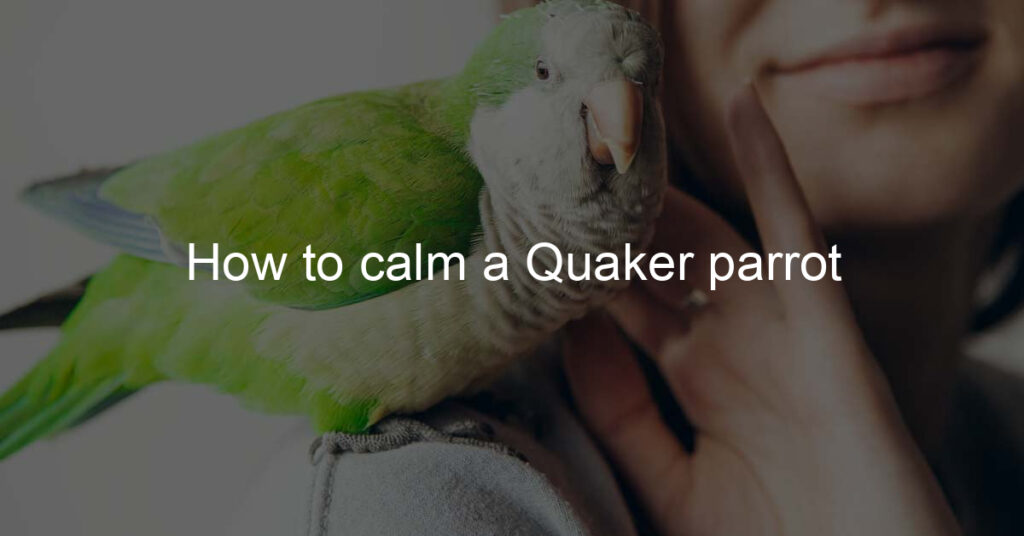Do you have a quaker parrot at home? We know how feisty and lively these birds can be – after all, that’s why many people love them! However, if your quaker parrot is over-excited or just having a bad day, then it might need calming down.
Fortunately, there are plenty of ways to do this – from providing distracting toys to changing up the environment. Here we’ll explore some techniques for how to calm your spirited little quaker parrot so it can live its best life with you!
- Provide a safe, quiet environment for your quaker parrot
- Create a predictable daily routine for the bird to follow
- Offer plenty of mental stimulation with toys and activities
- Allow your quaker parrot to engage in natural behaviors like climbing and flying
- Introduce calming sounds like classical music or nature recordings
- Regularly provide physical contacts such as head scratches and cuddles
How do you make Quaker birds quiet?
Despite their name, Quaker parrots can be quite noisy. Thus, it can be difficult to enjoy quiet in a household that owns one of these birds. Luckily, there are several strategies for making Quaker parrots a bit more hushed.
First and foremost, owners should keep the bird in a comfortable environment that is free from any disturbance – this includes providing areas to sleep as well as places to play outside its cage.
Additionally, playing calming music or keeping other types of white noise can help drown out the bird’s incessant chirps and screeches.
To truly prevent excessive noises, however, owners must also engage with their birds throughout the day – offering training sessions or spending quality time engaging in fun activities such as playing fetch or learning new tricks.
With a combination of attention and contentment, owners are sure to have a quieter home environment.
How do I stop my Quaker from screaming?
Training your Quaker parrot not to scream is a task that will require patience and dedication. You can begin by identifying the recurring situations that trigger screaming, such as loud noises or sudden movements.
Once you have identified the triggers, try to eliminate them from their environment. For example, if loud music causes your bird to become stressed and emits a loud noise, keep the music in a setting that does not disturb your pet.
Additionally, distract your Quaker by providing more engaging activities such as playing with toys or making up new games to keep them occupied.
Finally, reward calm behavior with verbal recognition or treats to reinforce it so they learn that quiet behavior is beneficial and gets rewarded. With enough time and effort, your Quaker will be able to significantly reduce their level of screaming.
How do I get my Quaker Parrot to trust me?
To get your Quaker Parrot to trust you, it’s important to devote plenty of time and energy to forming a bond.
The key is making sure that every interaction with your Quaker is positive for them and rewarding. Give them a safe place to live in your home and make sure their daily needs are met: fresh food, water, and the possibility to socialize with humans.
Show your parrot that you are trustworthy by speaking softly around them, respecting their boundaries, and providing stimulating activities both inside and outside of the cage.
Additionally, offer treats as rewards when they do something you want them to learn, like perching on your hand or vocalizing along with you. With consistency and patience over time, your Quaker will learn how to trust you – and in turn, give back many years of friendship!
Conclusion
Overall, calming a quaker parrot is no small feat. From investing some extra time in your bird to providing them with interesting objects to play with such as stones or rope, there are multiple strategies you can employ to calm your quaker parrot and ensure it remains a valuable and loyal companion for years to come.
One of the best methods is simply spending quality time together. Talking calmly or listening to classical music can help create an atmosphere of tranquillity, and both allow for bonding experiences that will strengthen the bond between you and your bird.
Additionally, when dealing with problem behavior be sure not to respond aggressively as this could lead to more unsavory actions in the future. Most importantly, remember patience is key when seeking out a calmer quaker parrot – they may take some time to adjust but eventually, they will understand their place and their newfound calmness will bring greater lasting joy into your life.








